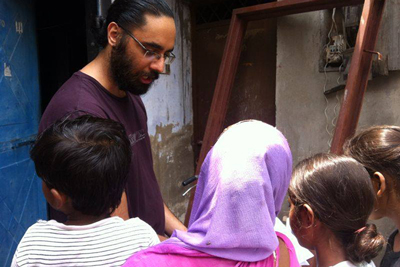July 29, 2014

Prakarsh Singh speaks with a mother and children in India
Amherst economics professor Prakarsh Singh has a bold idea for combatting child malnutrition in India: Why not reward government-funded health workers who help children become healthy and inform mothers about the right diet for their kids?
Singh has been awarded a competitive $100,000 Grand Challenges Explorations (GCE) Award from the Bill & Melinda Gates Foundation for this proposal. He will use the funding to run an ambitious 18-month experiment evaluating the use of monetary incentives in the public health sector.
If the project is a success, it could one day impact health and social welfare policy in India.
“Malnutrition is a huge problem in India,” Singh said. “Almost half the children in the country under age 5 are categorized as stunted, and this number has not fallen significantly during the past 20 years, despite the country’s high economic growth.”
“I am interested in what the government can do to solve this problem, because it has huge implications for India’s future in terms of reducing mortality, increasing human capital and economic growth and making government services more efficient.”
Singh said about 1.3 million workers serve children food in the country’s government-run day care centers. They earn their fixed salaries by providing guidance on nutrition to mothers and midday meals to more than 80 million preschool children.
But there appear to be what Singh calls “leakages” in the service delivery system, and monitoring it is difficult. In addition, mothers participating in the program lack information and the voice to make changes, he said, and the workers themselves are unhappy with their wages.
Singh and his team—which will include Amherst undergraduate research assistants—will test the effectiveness of providing small bonuses to health workers who succeed at their jobs according to three long-held, incentives-based economics performance schemes: pay for performance, pay proportional to relative performance and winner-take-all.
The project will take place in close to 250 day care centers in urban slums of Chandigarh and will target about 7,000 children and their mothers. The government has given permission to Singh to conduct the project and will be collaborating with him.
In the first scenario, workers will receive a set amount for every child under their care who gains a pre-determined amount of weight for his or her age.
In the second, also known as relative performance pay, the caregivers will get a proportion of the total money available, depending on how they do relative to their counterparts.
The third treatment, winner-take-all, is informally referred to as the tournament model. Workers whose children together gain the most weight will receive the entire bonus.
In all three schemes, mothers will also be given specially designed recipes recommended by the government to cut their costs and boost their child’s nutrition.
“From a policy point of view, we are spending the same amount of money in all three scenarios,” said Singh. “But this experiment will tell us what gives the best bang for the buck.”